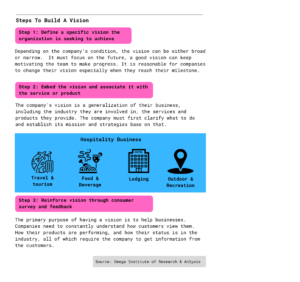- Industries
Industries
- Functions
Functions
- Insights
Insights
- Careers
Careers
- About Us
- Hospitality
- By Omega Team

Why Need a Vision?
In general, a vision is the mental picture of the future you desire. The vision for your company defines where you want it to be in the future. It embodies our hopes and dreams, more than just a goal.
In business, having a vision is critical. It is a powerful tool to achieve results. It means we have a clear sense of purpose and a much larger picture of our business than simply setting and reaching short-term goals and tackling problems as they come along.
A clear vision can provide a gathering point or common interest for the members. It gives deeper meaning to the work and helps unify everyone into a team to contribute together to the vision. It is also inspiring. It creates energy and enthusiasm and fosters change. Vision is especially important in difficult times. It produces persistence and reminds you why you started. The vision also provides a direction for the business. The vision can help you make the decision and define your short-term and long-term goals.
The hospitality industry provides services including travel, catering, accommodation and recreation. Typically companies embed their vision or mission alongside the products and services they provide and set a standard or an ideology of what they provide.
Exhibit 1 shows the steps for a hospitality company to build their vision.
Exhibit 1: Steps To Build A Vision

Why change your vision?
The main factor driving companies to change their vision is “trend”. Our society goes through changes every day and in the context of highly developed technology and sustainability, which is propelling organizations to re-evaluate. Corporations need to revisit their vision over time to maintain their competitiveness.
Technical and Innovation Drives
Technology and innovation have always confronted businesses to re-evaluate how they do business. As new trends emerge and as technology becomes widely used, the customers within that industry are going to start to expect to see certain things. For example, contactless payment technology and mobile check-ins, along with cleaning technology, such as cleaning robots, these all minimize direct human-to-human contact. Due to the coronavirus pandemic, these behaviors and expectations have been accelerated. Connectivity and data are essential in hospitality. Guests increasingly need a high-quality and personalized experience, which drives the companies to invest in optimizing their business with the latest innovation and technologies. Take mobile devices as an example. From smartphones to tablets, which have become consumers’ ever-present portals to the world, are a vital component of the hospitality industry’s technology renaissance.A whopping 92% of guests carry a smartphone, and 40% use hotel apps on them, while another 30% are inclined to download one. Just as smartphones increasingly perform everyday tasks, from shopping to bill paying, guests want these mobile devices to access hotel information, services and expedite mundane processes. Customers report a better experience when hotels and resorts use the latest technology to assist them. Hospitality managers have sharpened their focus on differentiating the guest stay via unique and personalized experiences in a bid to strengthen loyalty and encourage repeat visits.
Sustainability
Over the last decade, guests have looked beyond amenities to decide where they want to stay. Now, they compare a property’s sustainable efforts to see if it matches their firmly held beliefs. The media suggests that ethical and sustainable issues have become a key consideration for consumers. Online research shows that consumer perception and reviews of sustainability on social media have increased over the last decade. From 2010, not only more reviews are on sustainability matters, but these mentions became more specific about details of hotel sustainable practices, implying that hotel guests are becoming more aware and concerned about sustainability.
In fact, this has prompted many companies to change their vision. Accordingly, there are five major trends in the hospitality industry to respond to increasing customer demand for sustainability. If you want to go green, you must first reduce the waste of water and utility, including managing the team and encouraging customers to reduce waste. Food waste also needs to be eliminated, getting staff from every hotel department to participate in figuring out where the majority of the waste comes from and deciding the best ways to reduce that amount. Reducing and replacing plastic products is another measure to stay sustainable. By not offering bottled water or straws will make your property a greener place to stay, but also gives it a classier feel. Hotels also need to promote a healthier environment. Both inside and outside a property and identify and eliminate what triggers allergies. Finally, decreasing carbon emission is the focus of society. Today’s customers are more enlightened and informed. What they care about is not only the quality of products and services but also whether they meet sustainable standards. The UN recently called attention to hotel emissions, saying they account for 1% of all carbon waste. The direction of public opinion can influence consumers’ choices, and policy pressure can also force companies to change. In response to the urge from all sides, the company must respond, and as a result, we see that many companies have added their intentions of sustainable development and reduction of carbon emission as part of their vision. It will take a bit of time to adjust to new ways of approaching energy usage, but it will minimize your carbon footprint and show your guests that your team is in this for the long run.
Conclusion
A vision of a company is the outlook of the future. In order to remain competitive, companies need to constantly examine their visions and change them according to the current trends. Whenever a major shift has the potential to impact your business model, you should take time to consider the potential impacts and whether or not it warrants a change in your vision statement.
In the hospitality industry, the rapid development of technology and sustainability have become important issues. Consumers expect technology to be used in all kinds of services, including hospitality. The digitalization of hotels promotes personalized shopping and staying experience and brings more customer loyalty to the company. At the same time, guests are increasingly concerned about the company’s efforts in sustainable development, and these efforts should be reflected in the company’s vision for guests and teams to understand.Subscribe
Select topics and stay current with our latest insights
- Functions